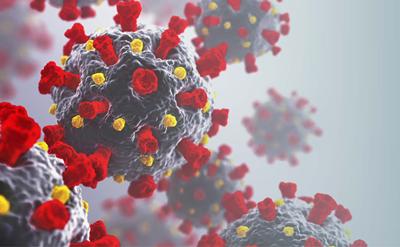Modifiable risk factors increase risk of brain complications in patients hospitalised with COVID-19

A new study highlights the range of brain complications experienced by hospitalised adults in the UK with severe COVID-19. Researchers found that strokes were a common complication, with higher rates than expected amongst younger people.
The findings of the study, published in the journal Brain Communications, also highlight that risk factors such as diabetes and high blood pressure, contributed to the risk of stroke, including in younger people.
During the first wave of the pandemic in 2020, the research team set up a rapid response, on-line anonymised data platform hosted by the Clinical Informatics Research Unit at the University of Southampton which enabled doctors throughout the UK to report COVID-19 related neurological and psychiatric problems. To date, the CoroNerve network are recognised globally as having contributed important data, with the first publication from this UK group in April 2020.
Of the 267 cases, strokes were the most frequently reported conditions, affecting nearly half of the patients. Over a quarter of strokes occurred in patients under 60 years old, many of whom had modifiable risk factors that meant they were already at risk of stroke. Other common conditions included delirium, psychiatric events and other evidence of damage to the brain (encephalopathy). More than 10 percent of patients experienced more than one neurological condition, and these patients were more likely to require intensive care and ventilation.
First author Dr Amy Ross-Russell, research fellow at the NIHR Southampton Clinical Research Facility at University Hospital Southampton NHS Foundation Trust, said, “It was striking not only how many different neurological and psychiatric events we observed in this study, but also that some of these conditions occurred together within the same patients. This suggests COVID can affect multiple parts of the nervous system in the same patient.
“Patients with strokes also had blood vessel blockages or thrombosis elsewhere in the body so this is important for understanding why some strokes occur during COVID-19.”
Ian Galea, Professor of Clinical and Experimental Neurology at the University of Southampton and senior author on the study said, “We found that the health status of patients prior to COVID predicted how much they recovered from neurological complications, which is important from a public health perspective. Optimizing health status could be a vital way to increase our resilience to this and future pandemics.”
The key take home messages are that COVID-19 amplifies the risk of stroke, including in younger people. Public health measures could reduce this, including lifestyle measures to avoid developing diabetes and high blood pressure, good control of blood sugar and blood pressure, and avoiding the risk of severe COVID-19 through vaccination and other public health measures.
The study was a collaboration between the universities of Southampton (Professor Ian Galea), Liverpool (Dr Benedict Michael), Newcastle (Dr Rhys Thomas) and University College London (Professor Sarah Pett). This is the third substantive publication from the CoroNerve Studies Group, after publications in Lancet Psychiatry (describing the first 153 adult cases of COVID neurological complications) and Lancet Child & Adolescent Health (focussing on COVID neurological complications in children). In the next phase, the COVID-CNS study will follow 1,300 patients in more detail to enable doctors to better understand how to treat patients with these complications.
